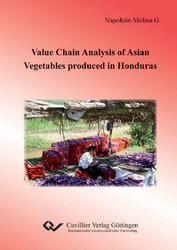| Areas | |
|---|---|
| Serie de libros (96) |
1381
|
| Nachhaltigkeit |
3
|
| Gesundheitswesen |
1
|
| Letra |
2370
|
| Ciencias Naturales |
5408
|
| Matemática | 229 |
| Informática | 319 |
| Física | 980 |
| Química | 1364 |
| Geociencias | 131 |
| Medicina humana | 243 |
| Estomatología | 10 |
| Veterinaria | 108 |
| Farmacia | 147 |
| Biología | 835 |
| Bioquímica, biología molecular, tecnología genética | 121 |
| Biofísica | 25 |
| Nutrición | 45 |
| Agricultura | 1005 |
| Silvicultura | 201 |
| Horticultura | 20 |
| Ecología y conservación de la tierra | 148 |
| Ciencias Ingeniería |
1795
|
| General |
98
|
|
Leitlinien Unfallchirurgie
5. Auflage bestellen |
|
Erweiterte Suche
Value chain analysis of Asian vegetables produced in Honduras (Tienda española)
Napoleón Molina (Autor)Previo
Indice, Datei (75 KB)
Lectura de prueba, Datei (93 KB)
In Honduras, value chains analysis of agricultural products are scarce. In view of that, a value chain analysis is employed to analyze the scope of local strategies to access and secure continued participation of Honduran Asian vegetables producers and exporters in international markets. Within the framework of a qualitative research design, a comparative case study of two regions, Comayagua and Olancho where Asian vegetables sourced from Honduras are planted, was chosen. To provide a theoretical basis that guides the report and analysis of the study findings, five areas of the related literature were selected and critically reviewed: i) the horticultural sector in Honduras; ii) value chain approach focusing on theory of value chain governance; iii) transaction costs economics theory; iv) resource dependence theory; and v) social capital theory. Besides structured observations, document review, and visual data, the interview was chosen as the main method for collecting data in this study. The sample of informants was comprised by 59 respondents including producers, exporters, importers/wholesalers, government agencies, research agencies, input suppliers and a NGO. The analysis reveals several findings: i) Asian vegetables in Honduras were introduced by the private sector initiative influenced by the confluence of several distinctive elements but without direct intervention of the government; ii) local actors engage in contractual relations primarily to reduce the uncertainty involved in the exchange of Asian vegetables, whereas economizing on the main transaction costs iii) As a result of the existing lack of trust and power asymmetries, local actors still have not acknowledged the need for consensus and long-term perspective which would facilitate reaching a commitment of collaboration between them; iv) there is no clear chain leader, therefore evolution of the value chain of Asian vegetables is mainly defined by changes in importing country’s government regulatory framework and external factors; v) strategic public services are not adequately provided to local actors which affect their performance in the chain, especially of producers; and vi) the major demand driver of this food system is ethnicity and currently the major opportunity lies in selling to Asians consumers groups in the U.S.
| ISBN-10 (Impresion) | 3869553685 |
| ISBN-13 (Impresion) | 9783869553689 |
| ISBN-13 (E-Book) | 9783736933682 |
| Idioma | Inglés |
| Numero de paginas | 326 |
| Edicion | 1 Aufl. |
| Volumen | 0 |
| Lugar de publicacion | Göttingen |
| Lugar de la disertacion | Universität Berlin |
| Fecha de publicacion | 15.06.2010 |
| Clasificacion simple | Tesis doctoral |
| Area |
Agricultura
|








